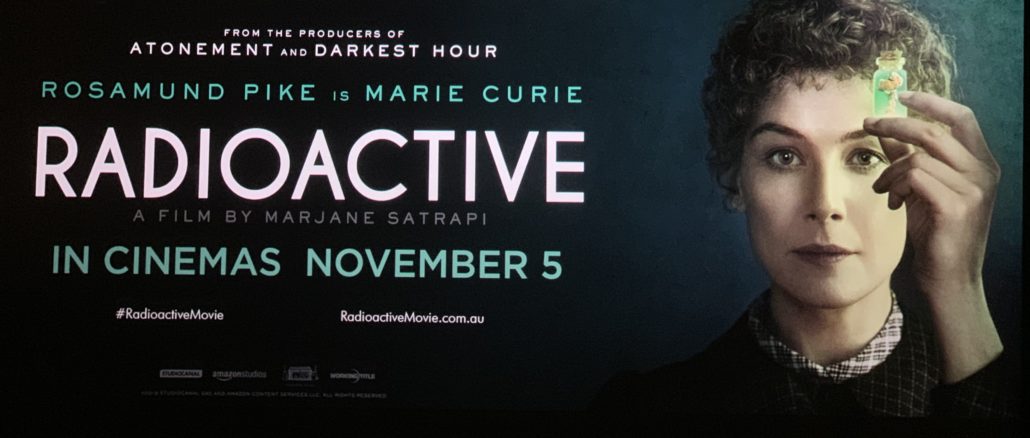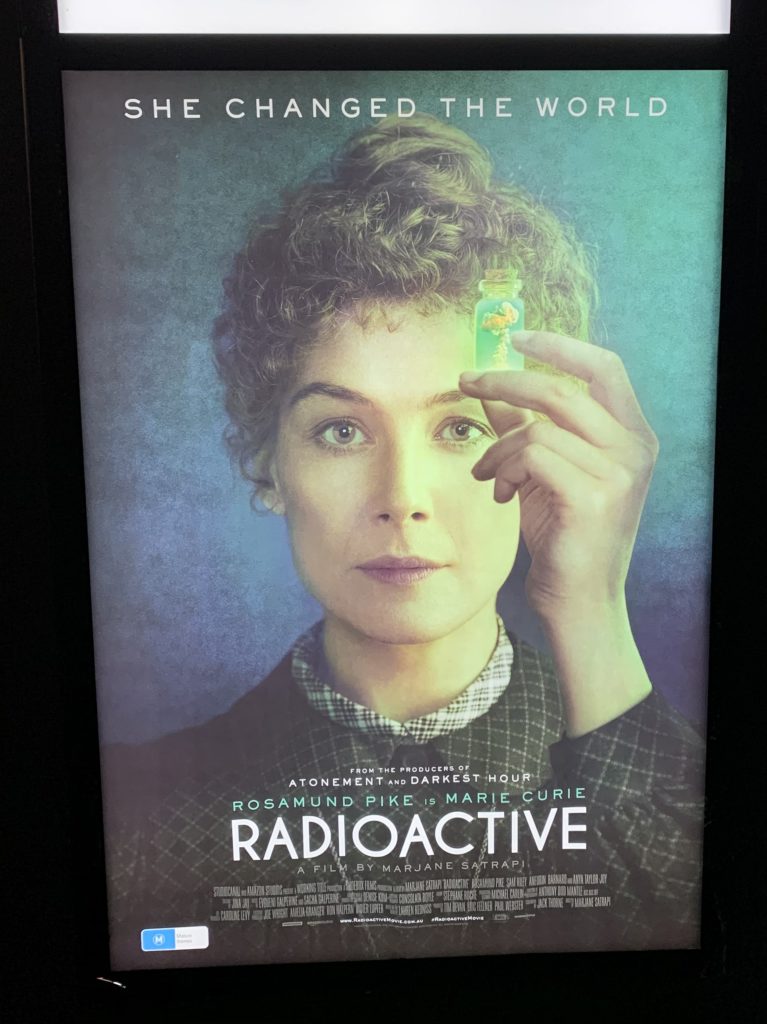
It’s strange how our universe works. I have been providing online school support to my youngest grandson Lachlan. He is working on a project titled Let’s End the Gender Divide based on a research paper about gender stereotyping in toy stores in the 21st century.
At the same time, I attended @StudioCanalAU enlightening movie RADIOACTIVE, released in Australia 5 November 2020. Who doesn’t know of Marie Curie and radioactivity that changed our lives?
Both experiences were a stern reminder how “our prejudices are still holding us back in the workplace even though men and women are more equal than ever before”. Yet this remarkable and somewhat abrasive woman, Marie Curie, shows how to fight the cause with explosive outcomes.
The Story
RADIOACTIVE is a journey through Polish born immigrant Marie Curie’s enduring legacies in the 19th century.
Her passionate relationships, scientific breakthroughs and the consequences that followed, fundamentally changed our understanding of radioactivity globally. She is also a wonderful example of how women can achieve success in the scientific world.
From the 1870’s we see Curie’s endless fight for her education as she battled the never ending gender barriers including the subject of a scandalised publication of intimate letters between another married physicist.
She stood her ground, encouraged by her internationally known physicist husband Pierre Curie. He was wonderfully supportive and together they discovered radioactivity. Yet it was Marie Curie, often assumed as her husband’s lab-assistant, who made the ultimate ground-breaking discovery and it was she who became the first ever woman to win two Nobel Prizes.
We connect with this brilliant scientist by her passion, drive and belief in research discoveries. She was a remarkable woman as was her discovery of radium “a peculiar and remarkable element that does not behave as it should”.
Academy Award® nominee Rosamund Pike is Marie Sklodowska Curie as she performs a brilliant role portraying Curie’s relentless research and pursuits in world dominated by men in the STEM (Science Technology Engineering Mathematics) fields.
As a female watching this movie I felt Curie’s frustrations. Maybe her aggressive manner was the only way this intellectual historical scientist could survive in a world resistant to her gender.
Historical scientific women
But how well do any of us really know what successes STEM women have achieved over the centuries?
Many would be unaware of the number of female pioneers that have achieved transformative world effects in their fields and we need more.
Mary the Jewess an alchemist who lived between the first and third centuries AD developed the art of turning base metals into gold and to this day the Bain-marie used in our kitchens was named in her honour.
In the 1800’s, German astronomer Caroline Herschell discovered several comets including one that bears her name. Mary Anning an English fossil hunter is known for her finds in Jurassic marine fossils. Lise Meitner an Austrian/Swedish physicist contributed to the discovery of the nuclear fission.
Elizabeth Garrett Anderson was the first English female doctor in the late 1800 to early 1900’s, her determination enabled other women to achieve such greatness.
Grace Hopper, an American computer programmer in the early 1900’s was nicknamed “Amazing Grace” whose legacy remains in modern-day computing.
American geneticist, Barbara McClintock who was finally awarded The Nobel Prize in 1983 suggested the idea of epigenetics 40 years or so before it was formally studied.
Russian Cosmonaut, Valentina Tereshkova the first woman in space on 16 June 1963 and still remains the youngest woman and first civilian to visit space at the age of 26.
British chemist Dorothy Hodgkin in the early to mid-1900’s, known for her advances in the field of X-Ray crystallography. She determined the atomic structure of cholesterol, penicillin and her vitamin B12 discovery won her a Nobel Prize for Chemistry in 1964, the first British female to win the prize. She also provided scientific advice to Margaret Thatcher.
Jane Goodall, British Ethologist was 23 when she saved enough money to journey to Kenya. In1965 she became one of the first to accomplish a PhD, despite lacking a degree. Her cohabitation and studies of the chimpanzees turned her experience to conservation and today inspires our next generation on the protection and safeguard of endangered wildlife.
Girls, you are needed
So we keep learning. If only I had been more aware, assertive and confident back when girls were never encouraged to follow these fascinating scientific studies. I eventually got there but not as early as I wished.
This movie is a reminder for today’s women. When questioned or threatened by condescending people, stand your ground as did Marie Curie. Her belief and determination changed scientific history and has shaped the 21st century.
In light of this, movies like RADIOACTIVE should be shown to both adults and students alike. I live in hope, particularly when I see schools teaching our children about the importance of removing the gender divide.
Society demands increased global representation for females in STEMS, essential for a balanced level of perspective and intelligence, integral for solid skillsets in the workplace.
As a side note, I am aware there are many males who have missed out on their passions due to gender stereotyping, but in this instance my argument is we need more females to explore and pursue STEM related streams. A great movie.
Cast: Rosamund Pike, Sam Riley, Aneurin Barnard, Simon Russell
Beale, Katherine Parkinson, Sian Brooke, Anya Taylor-Joy
Director: Marjane Satrapi
Screenplay: Jack Thorne
Producers: Tim Bevan, Eric Fellner, Paul Webster
Based on the book: by Lauren Redniss
In cinemas from 5 November 2020
Acknowledgements:
- 2018. Lachlan Christie school project research paper on “Let’s end the Great Gender Divide” & the Christmas campaign, “Let Toys Be Toys” from opinion piece by Eleanor Muffitt, The Age 8/11/2018.
- https://www.sciencefocus.com/science/10-amazing-women-in-science-history-you-really-should-know-about/
Ruth Greening holds a Bachelor of Arts degree majoring in Psychology & Philosophy. Before retirement, she worked for over 40 years in the corporate world in Melbourne and Brisbane and progressed into senior management positions and project roles for both private industry and government.
In her 70th decade, she continues in casual roles as a freelance writer, model, and actor participating in small movies, TV commercials and User Generated Content.
As a grandmother, she is known as Nanny Babe to her grandchildren and writes from a Baby Boomer perspective on her blog www.nannybabe.com. An avid crafter Ruth actively participates in sewing, crocheting and knitting.
While she continues to pursue her artistic passions, Ruth is dedicated to maintaining her health and fitness as she ages by attending the gym, dancing and walking and thrives on mentoring others.
Connect with Ruth or our moniker Nanny Babe; nannybabegengp.blogspot.com.au/




Leave a Reply